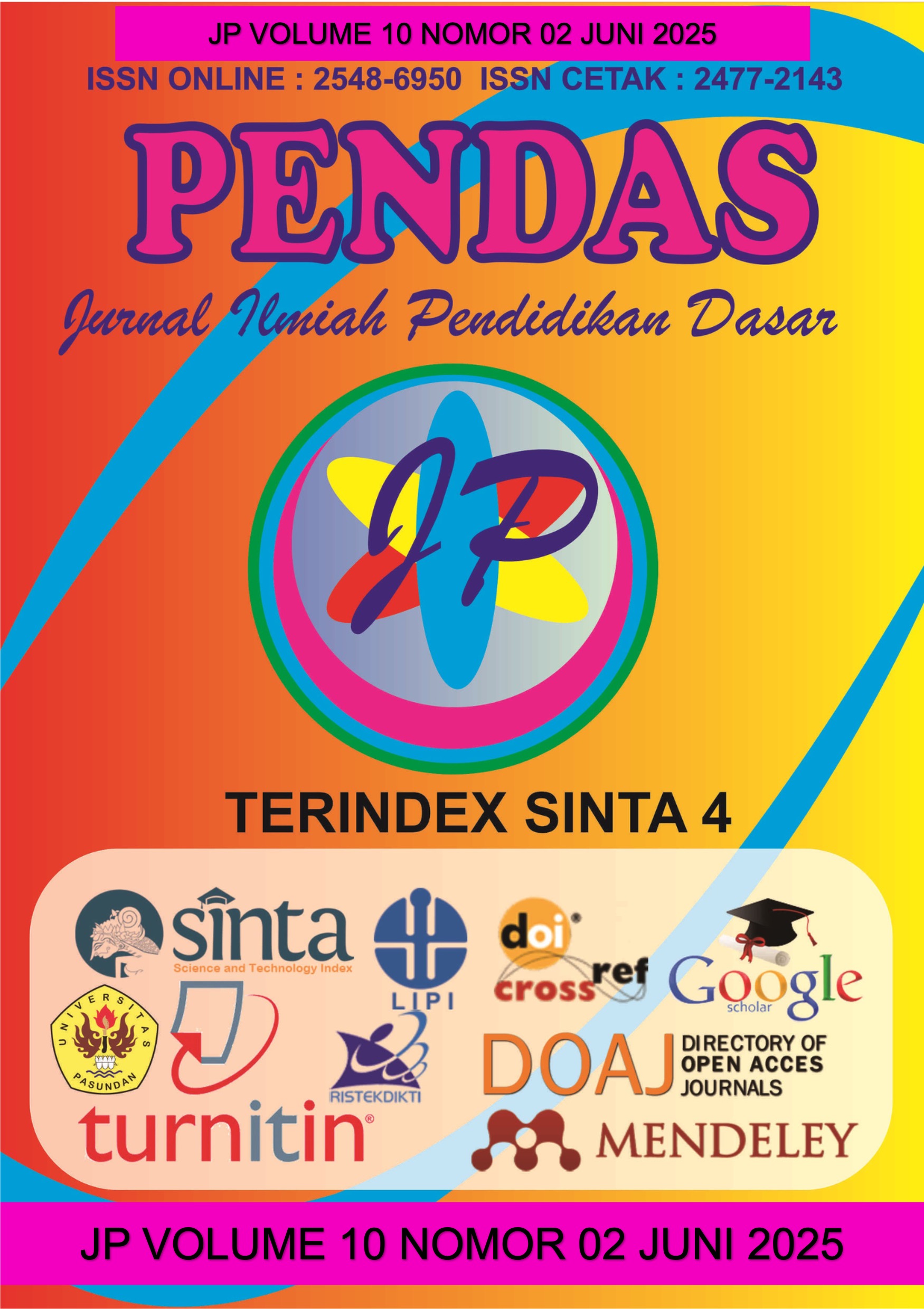EFEKTIVITAS MODEL PROBLEM BASED LEARNING BERBANTUAN LKPD TERHADAP HASIL BELAJAR MATEMATIKA SISWA KELAS 5 DI SD 1 UNDAAN KIDUL
DOI:
https://doi.org/10.23969/jp.v10i02.23670Keywords:
Problem Based Learning, LKPD, Mathematics Learning OutcomesAbstract
This research is based on the application of an ineffective learning model, which has resulted in many students failing to meet the Minimum Completeness Criteria (KKM). This research aim to determine the effectiveness of the Problem Based Learning (PBL) model assisted by Student Worksheets (LKPD) on the mathematics learning outcomes of class 5 students at SD 1 Undaan Kidul. This research uses a quantitative approach method with a Quasi Experimental Design, specifically the Nonequivalent Control Group Design. The sampling technique uses total sampling. The data collection techniques in this research used pretest and posttest assessments administered to class 5B as the experimental class and class 5A as the control class. The data analysis techniques used are the Shapiro-Wilk normality test, homogeneity test, t-test, and N-Gain test. The research hypothesis states that there is a difference in learning outcomes between students who use the Problem Based Learning model assisted by LKPD and those who use the conventional model. Based on the results, the mean N-Gain for the experimental class was 61.18%, which is categorized as quite effective. Meanwhile, the mean N-Gain for the control class was 29.99%, which is categorized as failed. It was concluded that the use of the Problem Based Learning model assisted by LKPD is quite effective in increasing the mathematics learning outcomes of class 5 students at SD 1 Undaan Kidul.
Downloads
References
Arikunto, S. (2018). Dasar-Dasar Evaluasi Pendidikan. Jakarta: Bumi Aksara.
Lestari, K. E., & Yudhanegara, M. R. (2017). Penelitian Pendidikan Matematika. Bandung: PT Refika Aditama.
Sugiyono. (2019). Metode Penelitian Kuantitatif, Kualitatif, dan R&D. Bandung: Alfabeta.
Afriani, L., & Reinita. (2023). 918 Pengaruh Lkpd Liveworksheets Berbasis Problem Based Learning Terhadap Hasil Belajar Tematik Terpadu Di Sekolah Dasar. Jurnal Ilmiah Pendidikan Dasar, 8(1), 918–931.
Butar, F. E. B., Sidabutar, R., & Sauduran, G. N. (2022). Jurnal Pendidikan Sains dan Komputer Pengaruh Model Pembelajaran Problem Based Learning ( PBL ) Terhadap Hasil Belajar Matematika. Jurnal Pendidikan Sains Dan Komputer, 2(2), 420–426.
Dian Dwi Suryani, Rina Dwi Setyawati, & Fenny Roshayanti. (2023). Pengaruh Model Pbl Menggunakan Lkpd Berbantuan Media Puzzle Pecahan Terhadap Hasil Belajar Matematika Kelas Iia. Didaktik : Jurnal Ilmiah PGSD STKIP Subang, 9(3), 776–788. https://doi.org/10.36989/didaktik.v9i3.1359
Dwi Ikasari, & Firmansyah, F. (2023). Pengaruh Model Pembelajaran Problem Based Learning Berbantuan Lembar Kerja Peserta Didik (LKPD) terhadap Kemampuan Penalaran Matematis Siswa di MTs. Lab Ikip Al-Washliyah Medan. Jurnal Ilmiah Pendidikan Matematika Al Qalasadi, 7(1), 55–65. https://doi.org/10.32505/qalasadi.v7i1.5882
Gede Swiyadnya, I. M., Citra Wibawa, I. M., & Agus Sudiandika, I. K. (2021). Efektivitas Model Problem Based Learning Berbantuan LKPD Terhadap Hasil Belajar Muatan Pelajaran IPA. MIMBAR PGSD Undiksha, 9(2), 203. https://doi.org/10.23887/jjpgsd.v9i2.36111
Jannah, A. R., Rahmawati, I., & Reffiane, F. (2020). Keefektifan model PBL berbantu media audio-visual terhadap hasil belajar tema indahnya keberagaman di negeriku. Jurnal Pendidikan PGSD, 8(3), 342–350.
Masdar, M., & Lestari, N. (2021). Pengembangan Lembar Kerja Peserta Didik Berbasis Problem Based Learning Pada Mata Pelajaran Matematika Materi Penjumlahan Kelas Ii Sd. Pedagogi: Jurnal Ilmiah Pendidikan, 8(1), 16–21. https://doi.org/10.47662/pedagogi.v8i1.239
Maulana, C., Tuerah, R. M. S., & Najoan, R. A. O. (2023). Penerapan Model Problem Based Learning untuk Meningkatkan Hasil Belajar Matematika Siswa di SD. Edukatif : Jurnal Ilmu Pendidikan, 5(6), 2333–2344. https://doi.org/10.31004/edukatif.v5i6.5711
Oktaviani, U., Kumawati, S., Apriliyani, M. N., Nugroho, H., & Susanti, E. (2020). Identifikasi Faktor Penyebab Rendahnya Hasil Belajar Matematika Peserta Didik di SMK Negeri 1 Tonjong. MATH LOCUS: Jurnal Riset Dan Inovasi Pendidikan Matematika, 1(1), 1–6. https://doi.org/10.31002/mathlocus.v1i1.892
Prastiwi, S. D., Khosiyono, B. H. C., Cahyani, B. H., & Nisa, A. F. (2023). Analisis Pembelajaran Pendidikan Pancasila Menggunakan LKPD Berbasis Proyek pada Peserta Didik SD. Pendas: Jurnal Ilmiah Pendidikan Dasar, 8(3), 1812–1819.
Rahmawati, S., Ardi Rafsanjani, T., & Aufia Abshor, D. (2023). Efektivitas Model Pembelajaran Problem Based Learning Berbasis Etnosains Terhadap Hasil Belajar IPA Kelas V SD. Jurnal Analisis Ilmu Pendidikan Dasar, 1–10.
Ramadianti, A. A. (2021). Efektivitas Model Pembelajaran Project Based Learning Terhadap Hasil Belajar Matematika Sekolah Dasar. Primatika : Jurnal Pendidikan Matematika, 10(2), 93–98. https://doi.org/10.30872/primatika.v10i2.668
Risanjani, A., & Kurniawati, R. P. (2023). Efektivitas Model PBL Terhadap Hasil Belajar Matematika Siswa Kelas IV Pada Materi Keliling dan Luas Bangun Datar. Seminar Nasional Sosial, Sains, Pendidikan, Humaniora (Senassdra), 2(2), 678–684. http://prosiding.unipma.ac.id/index.php/SENASSDRA
Sujarwo, C. G. (2021). Analisis Lembar Kerja Peserta Didik (LKPD) Berbasis Problem Based Learning Terhadap Hasil Belajar Siswa. Cybernetics: Journal Educational Research and Social Studies, 2, 123–130. https://doi.org/10.51178/cjerss.v2i4.320
Wahyu Ariyani, O., & Prasetyo, T. (2021). Efektivitas Model Pembelajaran Problem Based Learning dan Problem Solving terhadap Kemampuan Berpikir Kritis Siswa Sekolah Dasar. Jurnal Basicedu, 5(3), 1149–1160. https://doi.org/10.31004/basicedu.v5i3.892
Downloads
Published
Issue
Section
License
Copyright (c) 2025 Pendas : Jurnal Ilmiah Pendidikan Dasar

This work is licensed under a Creative Commons Attribution 4.0 International License.














































